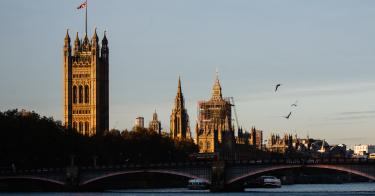Britain has left the European Union. Now, the United States faces a simple choice. It can either stand idly by as other nations make trade deals with Britain, or it can negotiate a free trade agreement for its own benefit.
Brexit Britain has been astonishingly successful in negotiating trade deals around the world. Of course there is its deal with the EU itself, struck at the eleventh hour before Christmas, and already passed into law in Britain. The EU itself has accepted that Britain has left.
But Britain has negotiated much more than that, concluding numerous other trade agreements that replicate the market access it enjoyed through the EU. In just the past few days, it’s announced deals with Canada, Mexico and Turkey. Britain has now concluded, or agreed in principle to, agreements with 64 nations or territories.
Nor has Britain merely replicated the EU’s agreements. It’s already negotiated its first free trade area, with Japan. Moreover, the British government has announced that it will apply to join the Comprehensive and Progressive Agreement for Trans-Pacific Partnership (CP-TPP), the 11-nation Pacific trade pact, early this year.
Including the now 27-member EU, 91 governments around the world, from Singapore and Switzerland to Germany and Ghana, now have or soon will have their own trade deals with Britain. That’s well over a third of the United Nations.
There are no barriers to a U.S.-Britain free trade agreement and the negotiations are already well advanced. The Irish border issue has been resolved. Britain is a high-wage, high-standard, law-abiding country that will live up to its agreements.
When the British people voted to leave the EU in 2016, commentators promised that Brexit would bring a parade of horribles. None of those horribles has materialized and have been refuted by the past four years.
Brexit did not cause Britain to turn protectionist. Quite the opposite: it has pursued free trade policies with great energy.
Brexit did not presage a British departure from NATO. In fact, it just announced its largest post-Cold War increase in defense spending.
Brexit did not herald the closure of Britain’s borders to immigration. Instead, it has implemented a points-based immigration system that will help to protect workers from the free movement of low-wage labor from the EU.
Brexit has not led to the hollowing-out of the City, the British equivalent of Wall Street. In early December, a Financial Times survey of 24 large international banks and asset managers found that “the majority had increased their London headcount over the past five years.”
And no, Brexit wasn’t caused by the Russians. In June, Parliament’s Intelligence and Security Committee found no evidence of Russian interference. When Britain’s foremost conspiracy theorist was faced with having to defend her claims in court in November, she dropped her defense that she was telling the truth and was ordered to pay costs.
The U.S. badly needs a positive trade agenda. The Obama administration made a start with the Trans-Pacific Partnership—the CP-TPP’s predecessor—but it was too slow getting off the mark. The Trump administration has largely focused on policing the nation’s existing deals. That must be part of any U.S. trade agenda, but it cannot be the entire agenda.
Right now, the nearly complete negotiations between the U.S. and Britain offer the best path to advancing such an agenda. And, of course, a free trade agreement would build on the vital trade and investment partnership—one of the most well-developed and mutually beneficial relationships in the world—between the U.S. and Britain.
The entry of the U.K., a G-7 economy, onto the world’s economic stage is a once in a lifetime event. Almost half the world’s nations have accepted Brexit’s reality. The U.S. must do likewise, or it will continue to fall behind as other nations strike their own deals with Brexit Britain.
This piece originally appeared in The Washington Times



